- Home
- Deborah Smith
Charming Grace
Charming Grace Read online
Charming Grace
By
Deborah Smith
Bell Bridge Books
This is a work of fiction. Names, characters, places and incidents are either the products of the author’s imagination or are used fictitiously. Any resemblance to actual persons (living or dead,) events or locations is entirely coincidental.
Bell Bridge Books
PO BOX 30921
Memphis, TN 38130
Bell Bridge Books is an Imprint of BelleBooks, Inc.
Copyright 2004 © by Deborah Smith
Print ISBN 978-0-9802453-1-8
Printed and bound in the United States of America.
All rights reserved. No part of this book may be reproduced in any form or by any electronic or mechanical means, including information storage and retrieval systems, without permission in writing from the publisher, except by a reviewer, who may quote brief passages in a review.
We at BelleBooks enjoy hearing from readers. You can contact us at the address above or at [email protected]
Visit us at www.bellbridgebooks.com
We like to hear from readers. Email us at [email protected]
Cover Design: Debra Dixon
Interior Design: Linda Kichline
Artwork Credits:
Cover photo: ZM Photography @ Fotolia
:M-01:
Ladyslipper, ladyslipper
What do you know?
Destiny’s dancers, on their toes
Pink shoes, green stage, pirouette in place
All for the joy of charming Grace.
Nursery rhyme written by
Grace’s mother, 1968
PART ONE
Los Angeles, California—
Do Tell! The Latest Hot Dish from Show Buzz Daily!
Beauty, Bodyguard Crack the Stone Man
Stone Senterra has fallen from grace—Grace Vance, that is—and the bodyguard he trusted to protect him helped it happen!
Hulky he-man action-film super-star “Stone Man” Senterra, along with his wife and kiddies, was spotted lunching morosely at Spago’s this week only days after fleeing the Georgia mountain locale of his film Hero for the safety of sunny L.A. Rumors are flying that final filming on Stone’s Oscar-hopeful directing debut ended in a brand of woman-trouble even the stalwart Stone Man couldn’t control.
The source of the bodacious babe brouhaha? None other than Grace Vance, Southern-belle widow of Hero’s true-life-inspiration, Harper Vance. Insiders on the Hero set say ‘Her Grace’ threw plenty of monkey wrenches into the Stone Man’s debut directing flick—not that people blame her for wanting to protect her noble-lawman hubbie’s image from a big-screen dumb-down by a no-necker like Stone ‘Action Figure’ Senterra.
(Dear Grace Vance: Dahling, don’t you understand that ‘dumb-flick deluxe’ describes almost all Hollywood block-bustas, so what did you expect from the Stone Man? Chekov on steroids?)
One casualty in the Widow Vance’s battle to control the flick about her brave, dead hubbie was the Stone Man’s ex-con bodyguard Boone Noleene, fired by Stone unceremoniously at film’s end. Sources say the world’s biggest action star accused his once-trusted sidekick of, shall we say, aiding and ‘a-bedding’ the Widow Vance’s war against the Stone Man’s film . . .
Now the notorious Noleene has disappeared in the company of some less-than-savory pals from his past, and stubborn Grace is holed up in her Georgia mountain mansion. Meantime, the Stone Man’s movie is on the rocks. Can more trouble be far behind in this twisted garden of magnolia-scented soap suds and Hollywood glam-glitter? More news as we get it, dahlings . . .
FOUR MONTHS EARLIER
Show Buzz Dateline: Dahlonega, Georgia.
Say it “Little Dah, big LON, little ega.”
The Cherokee Indian word for gold.
Mountain home of the first U.S. gold rush, 1838.
Been pretty quiet since then, and people like it that way.
Population 3,527
Plus now, one movie star
Chapter 1
“Grace Bagshaw Vance will end up in jail, in the gutter, or drunk on martinis in some fancy nut hatch for ex-beauty queens,” people whispered about me. “Bless Her Heart.”
It was true. By the day Stone Senterra came to my Georgia home town to make a movie about my husband, Harp Vance, I was ready to kill him and accept the consequences. I’d become a deadly, determined, Bless Her Heart kind of Southern belle. A cracked belle, you could say. Grieving can take over a person’s life like a sinister charm, inspiring good causes and noble dedication at the expense of true healing. It’s possible to both pity and fear a mourner who’s gone just a little bit funny and more than a little bit dangerous. I qualified on both counts. In the South, the dreaded BHH is attached to your name with admiring sympathy but also a dollop of fear. You are no longer a dependably entertaining person, and may even stoop to becoming an embarrassment.
Be afraid, Dahlonegans whispered. Be very afraid. Bless her heart.
Two years ago, Harp, an agent for the Georgia Bureau of Investigation, tracked down a killer the media had dubbed the Turn-Key Bomber. After months of cat-and-mouse games through the mountains of Georgia, Tennessee, and the Carolinas, Harp and the serial-killing psychopath faced off on the roof of one of the largest hospitals in Atlanta. And there, on a hot summer morning when the sun rose over the city like an orange eye, my husband stopped the crazy bastard from exploding a bomb that would have killed a lot of people. Harp took six bullets to the chest before he sank a hunting knife into the Turn-Key’s throat. His police methods had never followed the rules. Neither did his death. The only rules he ever believed in were the ones I imposed on him out of love.
Helicopter cameramen from CNN’s Atlanta headquarters and the local TV stations broadcast the death-fight with the bomber as it happened, and so the whole world watched Harp sacrifice his own life to save the hospital. I watched, too, in horror, from my hostess chair on the set of a silly morning talk show called Atlanta A.M. My husband had been a loner and a damaged soul and an idealist and a cynic and a lover and my best friend since we were kids. I got to the emergency room only in time to cry my heart out and whisper, “It’s all right. Don’t be afraid of the dark. I’ll always be there with you,” before he took his last breath.
I had been there, in that darkness, fighting to keep a light burning for him, ever since.
So, on a cool May morning while Stone Senterra cruised up the mountain interstate in his limousine, I planned my ambush. Senterra and his people were scheduled to start on-location filming from an old campground Senterra Films had leased as a base of operations. I intended to block Stone’s way with the one material he respected. Stone.
“Stand back. I’m dropping the whole load on the count of five,” I called out the dump truck’s window. My Grandmother Helen—known to her three children and ten grandchildren not as Grandmother, Grandma, or Granny, but as the elegant and indomitable G. Helen, tucked her pearls inside her cashmere-trimmed denim jacket, fluffed graying auburn hair, then motioned to Harp’s teenage niece, Mika DuLane. “Five means ‘four and a promise’ to your impatient Aunt Grace,” G. Helen warned the sixteen-year-old.
Mika nodded. “Let’s boogie.”
My tall, elegant, Irish-pale grandmother sashayed briskly alongside the short, cute, mocha-skinned Mika, whose idea of fashion was an army jacket covered in computer game logos. When she and G. Helen reached the side of the steep road Mika called back, “Aunt Grace, maybe you should wait while I do some calculations to estimate the area of spillage based on the tonnage and the maximum angle of the dump truck’s bed.” She reached inside the army jacket for her Palm Pilot.
“Aim for the center line and let ‘er rip,” G. Helen called. Then t
o Mika, “Sweetie pie, sometimes we just have to dump our load and get the hell out of the way.”
I pulled a lever. The truck’s bed upended and gray dust gushed out as tons of silver-gray gravel spilled onto the asphalt. When I finished, a small mountain of rocks blocked both lanes of the only paved road that led to Stone Senterra’s mountain production headquarters. The road’s grassy shoulders dropped immediately into deep gulches filled with boulders and laurel. Stone Senterra wouldn’t be able to reach his luxury house trailer or his Quonset-hut film editing lab or his picnic-pavilion-turned-personal-gym. He’d have to deal with me.
Face-to-Stone Face.
I climbed atop my barricade of metaphorically crushed Stone Senterra, pulled Harp’s favorite leather-brimmed hat low over my forehead, laid G. Helen’s antique shotgun across my updrawn knees, and set a magnificent wild orchid beside me in her moss-stained clay pot. A pink, pouch-shaped bloom, as delicate as a ballet slipper, hung from the orchid’s slender stem. She had bloomed that morning as if she knew Harp and I needed her support. There was no way past me, the shotgun, and the native ladyslipper orchid Harp had named Dancer.
The morning grew quiet as the deep shush of settling rock faded away. Ridges of pines and greening hardwoods marched toward a horizon of rounded, fog-gray mountains and deep, mystic hollows. Deer and bear sniffed the air as if sensing the impending aroma of city slickers.
“I’m set,” I called to G. Helen and Mika. “Go home and call that list of media contacts I gave you, all right? Dancer and I’ll take care of the situation here. Don’t worry about me. A grand jury of Lumpkin County folk will vote a no-bill on the attempted homicide charge so fast they’ll be home in time for the lunchtime reruns of Matlock on A&E.”
“If you do shoot,” G. Helen said, “At least don’t aim for Senterra’s head.”
I nodded. “It wouldn’t do any good. He has no brain.”
G. Helen rolled her eyes. Mika stared at me, her eyes dark with amazement. She came from the very rich, very elegant DuLanes of Detroit, Michigan. In Detroit, tasteful people didn’t shoot at movie stars. They also didn’t name their orchids and talk to them. “I’ll visit you in prison,” she called.
G. Helen and Mika left in G. Helen’s dark-blue Lincoln. My hands sweated on the stock of shotgun, where a silver plate was engraved with words that summed up everything G. Helen had taught me about life.
Always fight back. And aim higher than you need to.
I bent my head and prayed. Harp, I’ll never stop defending you. Please let me know that I’m doing it the right way. Please let me know that Dancer bloomed this morning as a sign to keep fighting.
Silence. Harp was whispering to me less and less, lately. Plus he’d never had a way with words and never believed in telling other people, or wild orchids, how to live their lives, as long as they hurt no one but themselves. Waiting for Harp to come back to life was no use. Of course I knew that. But I had no idea he was about to send me a stranger named Boone Noleene with his answer. Or that maybe Boone was the answer.
Poor, brave man.
Bless his heart.
Ask Grace ‘Who’s Boone Noleene and what job does he do for Stone Senterra?’ and she’d have given you one of her solemn, beauty-queen-being-polite-in-the-interview looks while she thought it over.
What would I do to achieve world peace? I’d spread more love, everywhere!
Who is Boone Noleene and what job does he do for Stone Senterra?
“I believe I read in People Magazine that he walks Stone’s pig,” she’d have said.
And she’d have been right.
His name—the pig’s—was Shrek. He’d been named by Stone’s little girls, who doted on the sway-backed, Vietnamese, pork-bellied snot-snout.
“What’s Shrek’s Cajun name, Boonie?” the girls asked me all the time, just to hear my answer in French. Sweet little darlin’s, just six and eight. They called me Boonie, Boo, the Boo-man. They didn’t understand the fading tattoos, the busted nose, the bullet and blade scars from New Orleans street fights. I was just Boonie, the tall man Papa trusted to guard them. Stone knew I’d take a fist in the gut for their sakes. For his sake, too. For his nice-kid teenage son, Leo. For his smart-tough-classy wife, Kanda.
Stone, who liked to brag that he’d played more lawmen than John Wayne and Clint Eastwood combined, had picked me out of Louisiana’s Angola Federal Prison three years ago to be his little rehabilitate-a-paroled-con project. It looked good for his image, he said. Stone never liked to come across as sentimental. But let me tell you what he did for me, and why I respected him.
I walked out of Angola without a penny to my name and nothing but denim blues on my back. There he was, Mr. Superstar, waiting for me in a limo. Him and Kanda. I guess he didn’t want me to think he was hittin’ on me. Anyway, a limo. And his wife. A man doesn’t just present any old so-and-so to his wife. Stone introduced me like I was a regular somebody, and then Kanda, who’s a combination of Jewish Wisconsin farm-girl, Hollywood businesswoman, and soccer mom, hugged me. Hugged me—a paroled con she’d just met.
“First we’re going to fly to L.A.,” he said, “and then when we get there, the first thing, we’re going shopping. You need some threads, mister. Then, once we get you spiffed up, you and me are going to a private mass in honor of your new life.”
“And then I’m taking you to meet my rabbi,” Kanda added. “If you don’t mind.”
I was dazed, drunk on fresh air and freedom, stunned by the turn my life had taken. All I remember saying to Kanda was, “I got nothing against going to mass or visitin’ rabbis. But I’d appreciate it y’all would have your priest and your rabbi call my brother, Armand, and give him a good word or two, I’d appreciate it, merci bien. I kind of hate leaving him here in prison, alone.”
She looked at my kindly. “Of course.”
Stone planted a big, movie-star hand on my shoulder. “Don’t worry about Armand. The day he walks out of here, I’ll be waiting for him, too.”
Imagine that.
I kept trying to say thank-you-why-are-you-doing-this? But he brushed me off. He launched into a long, rambling story about how his old man deserted their family when he was a kid, just like mine and Armand’s had, but how he couldn’t complain because at least his mother hadn’t died when he was a kid like ours had, no, she’d remarried and kept a roof over the family’s head, although the man she married was a big, mean dockworking bastard, so Stone had had a hard time living with him, the step-papa, growing up, and grown up fighting for everything plus defending a baby half-sister, Diamond, from the old man.
“See?” Stone finished. “You and me, Noleene, we’re both survivors. We’re tough guys. We’re simpatico.” He paused. “By the way, if you screw up this chance I’m giving you? I’ll kill you.”
“I won’t screw up,” I said.
Even now, three years later, I still didn’t know why Stone Senterra, a wealthy, famous stranger, felt the need to treat me like his new best friend and tell me his personal story, other than the fact we’d both been deserted by our papas as kids, and we both came from good Catholic mamas. Once we got past those basics, he was a movie star born in New Jersey, and I was an ex-criminal born in New Orleans. Not much else in common.
But I knew this much: He’d given me a future. More than that, he’d given me a family—and by association, my bro, Armand, too. Armand would be out of Angola by fall, paroled a year early thanks to Stone’s attorneys. A family. One worth honoring, serving, and protecting.
What’s Shrek’s Cajun name, Boonie?
“Le Snout Du Oink, ma petite cheres.”
They laughed every time.
But if you asked Stone, the pig’s name changed depending on who the Stone Man’s box-office competition was that season. Lately the pig had been Bruce Willis, Jackie Chan, Chris Tucker, Vin Diesel, and The Rock, but most of all, more than anyone else, forever-and-ever-Amen, the pig was Mel Gibson.
“Mel Gibson took a dump on the Turkish rug again
, today.” Stone liked to say. Or, “The maid caught Mel Gibson eating out of the kitchen garbage again this morning.”
Stone envied Gibson the way cheese envies cream. It was a mark of distinction to be Stone’s pig. It meant you were a threat. Mel was the ultimate pig threat; the others were only satellites in Mel’s pig-threat orbit. Arnold Schwarzenegger called once and asked when the hell he was going to be the pig, again.
Stone told him to get in line.
“I feel like a fool, Noleene. This ambush of Grace Vance had better work.”
Beside me, squatting in the Dahlonega woods on the heels of Burmese snake-skin cowboy boots, Stone was muttering. He’d been muttering for an hour. Let’s just describe the Stone Man this way: Picture John Wayne playing Vito Corleone on a hike wearing an Armani suit.
When ten of your films have made 300 million dollars—that’s each, not total—you tend to start thinking you deserve anything you want, including the right to film the life story of a dead GBI agent you admire, even if the agent’s widow keeps threatening to kill you. So the Stone Man was not happy to be hiding in the bushes like a wuss, waiting for an introduction.
“The hell with this. I’m just going up there and talk to her. She wants to like me. She wants to be happy that I’m here to make a movie about her husband. I know she does. What’s not to like?”
I shook my head. “Boss, you agreed to let me handle the introductions. You promised Kanda, too. For her and the kids. Besides, if you go up there and Grace Vance shoots you, it’ll make me look bad. I might have to give up my parking spot at the bodyguard union hall.”
Stone glared at me the way gorillas do when they’re about to rip a banana off a tree, but he knew I was right. I’d done a good job taking care of his and his family’s safety at home, on movie sets in jungles and on mountaintops, and even at the Oscars (he was afraid of Joan Rivers, so I had to body-block her while he walked up the red carpet.) Finally, he sighed and nodded. “All right, but this better work. I’m getting an itch in my hair plugs. You get up there and sweet-talk Grace Vance. Get the gun away from her, then I’ll pop out of the woods and make nice. Go.”

 Legends
Legends Hold on Tight
Hold on Tight Just a Little Bit Guilty
Just a Little Bit Guilty The Beloved Woman
The Beloved Woman Alice At Heart
Alice At Heart Heart of the Dragon
Heart of the Dragon Critters of Mossy Creek
Critters of Mossy Creek Diary of a Radical Mermaid
Diary of a Radical Mermaid Caught by Surprise
Caught by Surprise Stranger in Camelot
Stranger in Camelot At Home in Mossy Creek
At Home in Mossy Creek Charming Grace
Charming Grace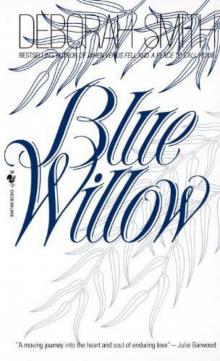 Blue Willow
Blue Willow The Pickle Queen: A Crossroads Café Novella
The Pickle Queen: A Crossroads Café Novella On Bear Mountain
On Bear Mountain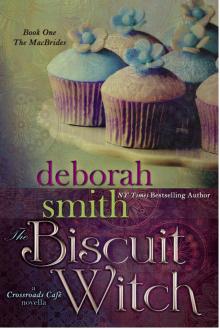 The Biscuit Witch
The Biscuit Witch Sara's Surprise
Sara's Surprise More Sweet Tea
More Sweet Tea The Apple Pie Knights
The Apple Pie Knights The Silver Fox and the Red-Hot Dove
The Silver Fox and the Red-Hot Dove Sweet Hush
Sweet Hush California Royale
California Royale Hot Touch
Hot Touch Miracle
Miracle The Stone Flower Garden
The Stone Flower Garden A Place to Call Home
A Place to Call Home Silk and Stone
Silk and Stone Honey and Smoke
Honey and Smoke Jed's Sweet Revenge
Jed's Sweet Revenge Silver Fox and Red Hot Dove
Silver Fox and Red Hot Dove The Kitchen Charmer
The Kitchen Charmer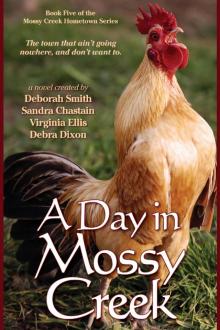 A Day in Mossy Creek
A Day in Mossy Creek Never Let Go
Never Let Go Summer in Mossy Creek
Summer in Mossy Creek On Grandma's Porch
On Grandma's Porch The Crossroads Cafe
The Crossroads Cafe Follow the Sun
Follow the Sun The Yarn Spinner
The Yarn Spinner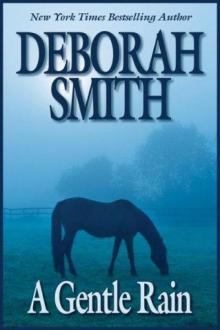 A Gentle Rain
A Gentle Rain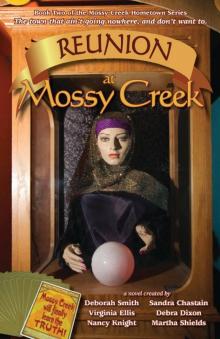 Reunion at Mossy Creek
Reunion at Mossy Creek